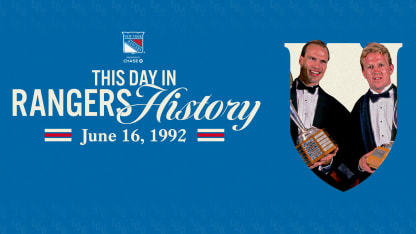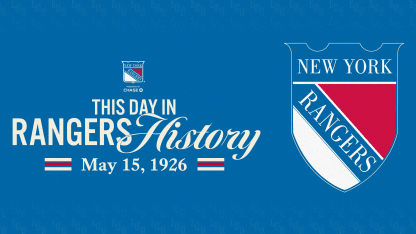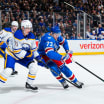Brian Leetch’s first interaction with Mark Messier occurred at Madison Square Garden on March 24, 1988, when the Rangers played the Edmonton Oilers. Leetch – who had just turned 20 years old and was playing in his 12th career NHL game with the Rangers after representing Team USA at the 1988 Winter Olympics – scored his first career NHL goal and added two assists in a 6-1 win for the Blueshirts.
But Leetch’s first NHL goal wasn’t the lasting memory he took away from the game; it was being speared in the gut by Messier, how no penalty was called, and how he needed to get up and back into the play.
The moment wound up being the first of many experiences that these two players shared on MSG ice in the decades that followed.
Over his first three full seasons in the NHL, Leetch had started to build an impressive resume. He had won the Calder Trophy for being the NHL’s Rookie of the Year in 1988-89, played in two NHL All-Star Games, and set the Rangers’ single-season record for assists with 72 in 1990-91.
But even with that early success, Leetch said that the turning point of his NHL career occurred early in the 1991-92 season, when the Rangers acquired Messier in a trade with the Oilers.
“I was having some success just statistically,” Leetch said recently. “But in terms of trying to figure out how to win and how to have a team come together – all the things that go into having a Stanley Cup contender – I was still in the learning stage as a young player. Mark had been through all of that, and I just soaked it up.”
In their first season together with the Rangers in 1991-92, Messier and Leetch did something that no other pair of NHL teammates has done since: win the Hart Trophy for being the Most Valuable Player in the league (which Messier did) and the Norris Trophy for being the Best Defenseman in the league (which Leetch did).
The success and chemistry that the two Rangers legends had together on the ice began with a connection off the ice.
“Back then, we would have roommates on the road,” Leetch said. “I was his roommate on the road starting with that first season, and I was able to watch him interact with everyone around him – players, staff, other people around the organization, and the fans – and he embraced all of it.
“On top of it, he was one of the best players in the NHL.”
When Messier was acquired on October 4, 1991, Rangers’ general manager Neil Smith said that it was “the biggest day in the 66-year history of the New York Rangers.” The Rangers won their first game with Messier in the lineup, 2-1, in overtime against the Montreal Canadiens in Montreal. Prior to the Rangers’ home opener on October 7, 1991, Messier was named the team’s captain. The Rangers won that game against the Boston Bruins – also by a 2-1 score in overtime – as Messier assisted on both Rangers goals.
Messier tallied a point in each of his first 11 games as a Ranger, as well as in 18 of his first 19 contests. Simultaneously, Leetch was putting together record stretches of his own. Beginning with the Rangers’ home opener, he posted a 14-game point streak that ran through the start of November. Then, a few weeks after that streak ended, Leetch posted a 17-game point streak and a 15-game assist streak – both streaks are franchise records that still stand today.
Always humble, Leetch deflected the credit for his record runs to his teammates, specifically Messier.
“That season, for whatever reason, coach (Roger) Neilson kept Jeff Beukeboom and me on the ice mainly with Messier’s line,” Leetch remembered. “We would play more than that, but every time that line was on the ice, it seemed I would be on the ice for a lot of it.
“I knew to get up ice and if there wasn’t an option for Mark to pass towards the net, I should be the third or fourth option coming in. It allowed me to have more opportunities and points.”
In rooming together on the road and driving to practices at home together – Leetch and Messier were the only two Rangers living in Manhattan at the time and commuted to and from the team’s practice facility in Rye – the two players discussed the game at length and how they wanted to play. The chemistry they built not only helped each of them have outstanding seasons statistically, but the Rangers have one of the best seasons in franchise history.
As Messier and Leetch racked up points, the Rangers racked up wins. A seven-game winning streak in December – culminating with the largest comeback win in franchise history, which was an 8-6 victory over the Capitals after trailing 6-1 – put them into a tie with Washington for first place in the Patrick Division. A 9-1-2 stretch from mid-January to mid-February vaulted the Rangers into first place in the NHL standings.
And by the end of the regular season, the Rangers had a 50-25-5 record and earned the Presidents’ Trophy, marking the first time they won the trophy and the first time they had the best regular season record in the NHL in half a century.
The Rangers’ strong run down the stretch of the season featured highlights from – naturally – both Messier and Leetch. On March 22, 1992, Messier scored four goals in a 6-3 victory over the Devils and tallied his 100th point of the season. Three days later, Leetch made one of the signature plays of the season – and his career – as he rushed the puck from behind his own net, all the way down the ice through the Flyers’ defense, to score what would eventually be the game-winning goal in the third period.
While the voting for the Norris Trophy wouldn’t take place until weeks later, the end-to-end rush might as well have earned Leetch the award at that point.
Going into the final day of the regular season on April 16, 1992, Leetch had 98 points. With the Presidents’ Trophy already secured, the Rangers’ goal for the day was to get Leetch to the 100-point plateau.
“Mark was the one driving it,” Leetch said. “He was the one saying, ‘you have to go for it now – you’re already this far, so you have to get that.’ He was mentioning it to other guys and talking about it.”
Leetch wound up with four points in a 7-1 Rangers victory over the Penguins at MSG, as he finished the campaign with 102 points and 80 assists; the 80 assists remain a single-season Rangers record, as Leetch eclipsed his own mark from the season prior. Messier finished the season with 107 points (35 goals, 72 assists), which was tied for the fifth-most in the NHL. Based on the combination of his own individual statistics plus the impact he made on the Rangers in his first season in New York, there was little doubt that he would receive the Hart Trophy.”
“It was just a different feel – in the locker room, in the arena, and in the sports scene in New York,” said Mike Richter, who along with Messier and Leetch, represented the Rangers at the 1992 NHL All-Star Game that season. “He was bigger than just the sport.”
The Rangers would become the biggest story in the New York sports scene and the hockey world two years later, when they won the Stanley Cup, thanks in large part to the heroics of Leetch (the Conn Smythe Trophy winner as the Most Valuable Player in the Stanley Cup Playoffs) and Messier (who became the only player in NHL history to captain two different teams to a Stanley Cup Championship, fulfilling the mission he set out to accomplish when he joined the Rangers).
The success that Messier and Leetch had together only further cemented a bond that began during their first season as teammates in New York. And, as the Rangers enter their Centennial, the accomplishments that both legends achieved – not just in 1991-92 or 1993-94, but throughout their entire tenures in New York – are among the most significant in the franchise’s storied history.
In Messier’s eyes, Leetch – the 20-year-old rookie who he welcomed to the league with a spear in 1988 – is the “greatest Ranger ever.”
As ‘The Captain’ told ‘The Garden Faithful’ when Leetch’s No. 2 jersey was raised to the MSG rafters on January 24, 2008, “for the next 100 years or more, they are going to point to Brian Leetch and say, ‘that’s what we want as a New York Ranger.’”





















